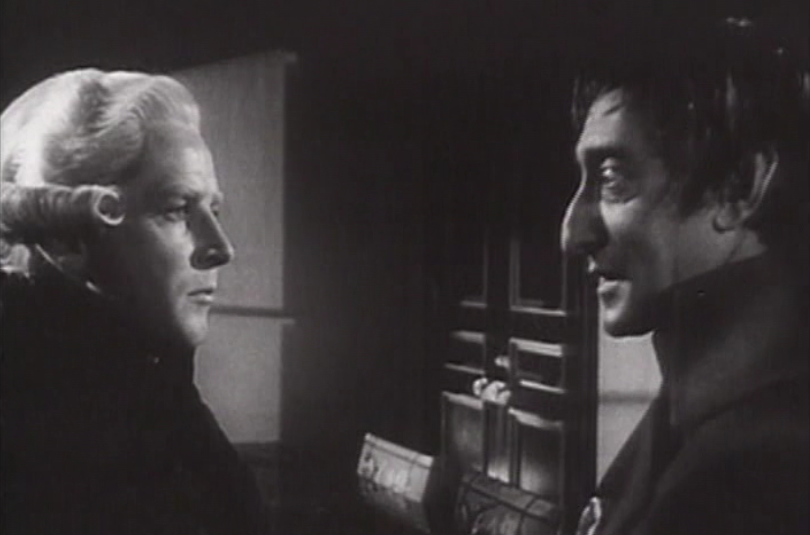Movie Review: The Black Book (1949) directed by Anthony Mann
The French Revolution is eating its own. The corrupt monarchy was overthrown, yes, and many of the cruel aristocrats executed or exiled. But the temptations of power have turned the Citizens’ Committee against each other, and control of the mob requires ever-increasing sacrifices of the “enemies of France.” It is a Reign of Terror (the alternate title of this film.) Maximilien Robespierre (Richard Basehart) is determined to stay at the apex of power, and now wishes to be officially declared dictator. Francois Barras (Richard Hart) is currently the only man who can make that motion in the National Convention. He refuses this betrayal of the principles of the Revolution and goes into hiding.

Robespierre has a plan for getting around this setback. He’s summoned a man from Strasbourg named Duval who is known for his ruthlessness in dealing with the enemies of the state, and sends secret police head Fouche (Arnold Moss) to fetch him from an inn. Robespierre explains that his “Black Book”, a listing of the people he means to have executed at some point and the evidence he has against them, has been stolen. As long as no one else knows the precise list of names, Robespierre has been able to play his enemies against each other. But if it falls into the wrong hands…Duval has twenty-four hours to investigate as the book must be secured before the next meeting of the Convention.
What neither Robespierre nor Fouche know at this point is that the man calling himself Duval is actually Charles D’Aubigny (Robert Cummings), an agent of the Marquis d’Lafayette. He secretly killed and replaced Duval as part of a plan to find out what Robespierre was up to. Knowledge of the Black Book makes his mission vital: if he can get that into the right hands, the Reign of Terror can be ended. Things are complicated as the one person in Paris who knows he’s not Duval is his ex-lover Madelon (Arlene Dahl) who he’s not on good terms with due to the “ex” thing, but is his one connection to Barras.
From there it’s a deadly game against all sides as D’Aubigny tries to navigate not betraying the Resistance while keeping enough good grace from Robespierre to continue pretending to be Duval. There’s several twists ahead!
As I understand it, this movie’s script was considerably altered from one that was more historically accurate, but much talkier. You might not want to watch it with an expert on French history the first time.
This movie is listed as a “film noir”, and was shot in black and white with many dark night scenes. The acting is excellent, though a modern audience might find it lacking in naturalism.
Richard Basehart plays Robespierre as a man so caught up in his own rhetoric that he sincerely believes everything he’s doing is for the good of France and that he’s in complete control so he doesn’t have to second-guess whether he’s doing the right thing or just what’s in his favor. Arnold Moss’ Fouche is much more self-aware, and is a delight on screen as the sneaky, amoral, look out for number one fellow he is. (Fouche survives the film only because that’s what happened to him in real life; he served under the next regime as well, so the Hays Code had to allow it.)
The “noir” really hits home in an exchange at the end that indicates that France will have a dictator after all.
Content note: Torture, children in peril, one of the bad guys kicks a cat.
Overall, an interesting semi-historical movie that has good performances in it. Some younger viewers may find it old-fashioned, but “Golden Age of Hollywood” movie buffs will enjoy the treat.

